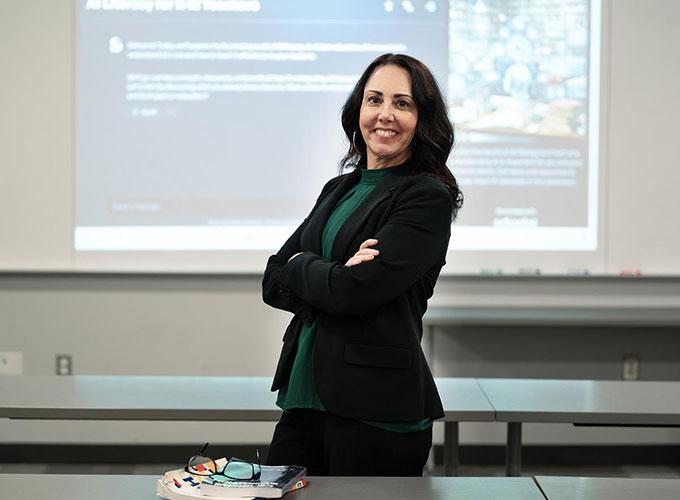Georgia Gwinnett College’s (GGC) Dr. Rebecca Cooper, professor of science education and director of academic assessment, is making a name for herself as one of Georgia’s foremost experts on incorporating artificial intelligence (AI) into the classroom, but her interest in the technology didn’t come from any of the many academic circles she’s operated in during her 22-year career.
“It was my own children who first introduced me to AI in the fall of 2023,” said Cooper. “They were using it to create study materials and quizzes, which sparked my curiosity. If students were likely to encounter this technology, I wanted to understand how it might impact teaching and learning for my preservice teachers.”
AI was just starting to gain momentum, so it was a bit of kismet that it caught her attention at that time, said Cooper, who has been at GGC for 10 years. She developed and taught online courses for more than 15 years and worked with faculty to incorporate technology into their classes. As she started delving into the technology, she quickly realized AI had great potential in the classroom.
After some experimentation and research, she discovered that the primary benefit is course design and development efficiency – something that could change the lives of the future teachers in her classrooms.
“AI significantly streamlines the process of creating engaging, meaningful assignments,” said Cooper. “It is particularly valuable for developing innovative activities like student-created podcasts or customizable project assignments. Additionally, AI assists in generating detailed rubrics and checklists, which provide students with clearer expectations and better support for their learning outcomes.”
Cooper said her teaching approach significantly transformed as she became more proficient with AI.
“I completely redesigned my technology course for student teachers to incorporate AI components after reading books and watching many webinars on AI and teaching.”
Last year, she was accepted into the Governor's Teaching Fellows Program, a professional development initiative offered to higher education faculty in Georgia, which seeks to enhance the quality of instruction in the state’s colleges and universities. As part of the curriculum, she developed a comprehensive suite of AI-integrated tools, including podcasts, interactive quizzes, study guides, chatbots and a collaborative note-taking tool.
“These tools, I hope, enhance student engagement and make course content more accessible across different learning styles,” she said.
It would be easy to let such powerful technology overtake the “human” side of teaching, said Cooper, so she only uses it as a supplement to traditional coursework.
“Of course, a proficient instructor uses AI for ideas and support,” she said. “I always adapt what AI provides to suit my students' specific needs.”
Cooper is well aware that many people find AI intimidating, if not downright frightening, but said no one should fear using it.
“I understand that hesitation completely – I approached it with skepticism initially as well,” she said. “However, through extensive research, including webinars, my own research, hands-on experimentation, and formal training through the Governor's Teaching Fellows Program, I have come to view AI as a valuable educational tool.”
Cooper said that, like any technology, AI requires responsible implementation. She pointed out that other transformative technologies, like the Internet, faced substantial initial skepticism but went on to revolutionize the way people communicate, learn, work and access information.
“While we must remain vigilant about issues like academic integrity and misinformation, we must also recognize that AI is becoming integral to our technological landscape,” she said. “The focus should be developing ethical, effective approaches to its use in education. AI may well follow a comparable trajectory to the Internet, particularly in educational contexts. The challenge lies in maintaining a balanced approach to innovation.”

